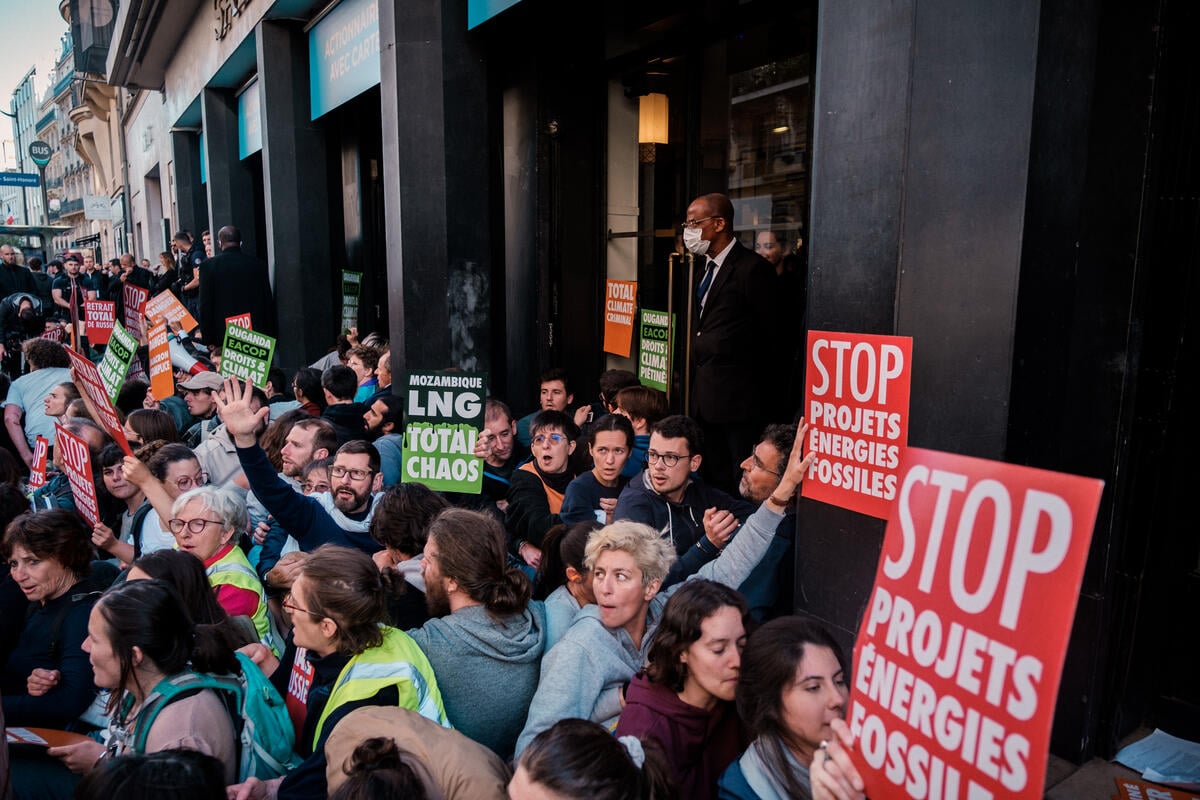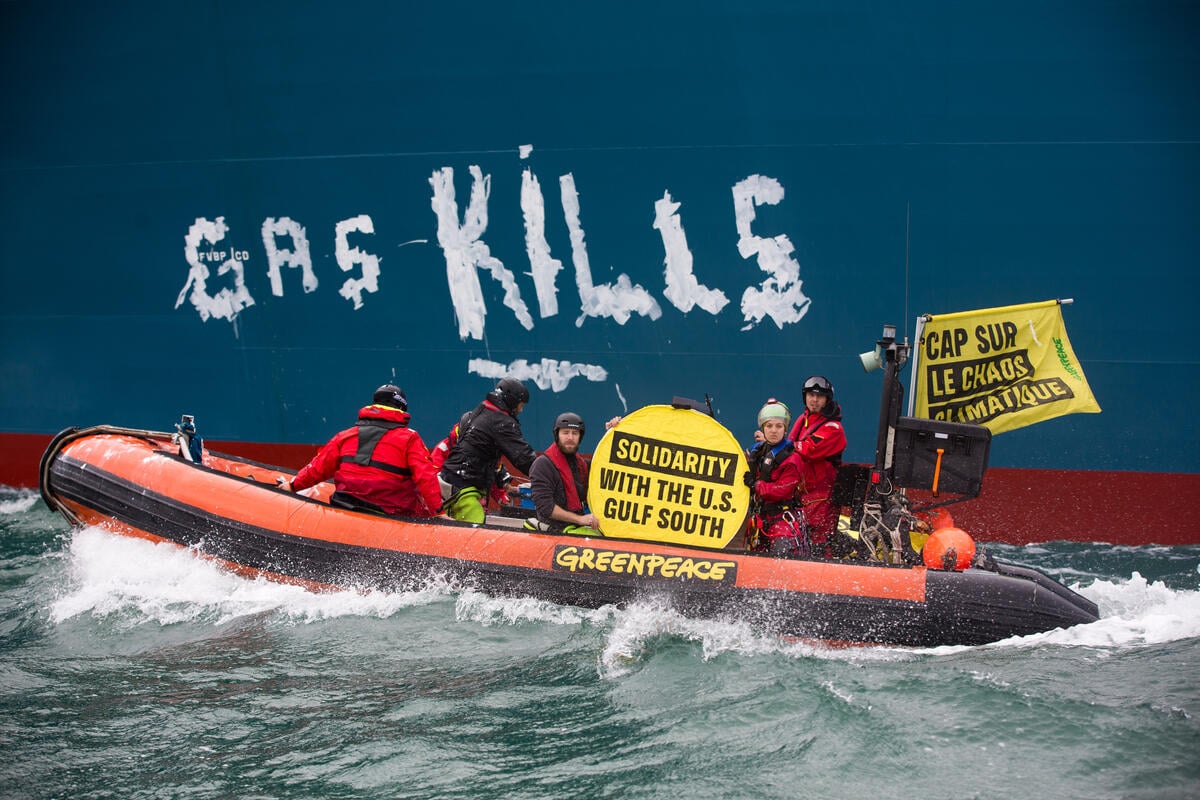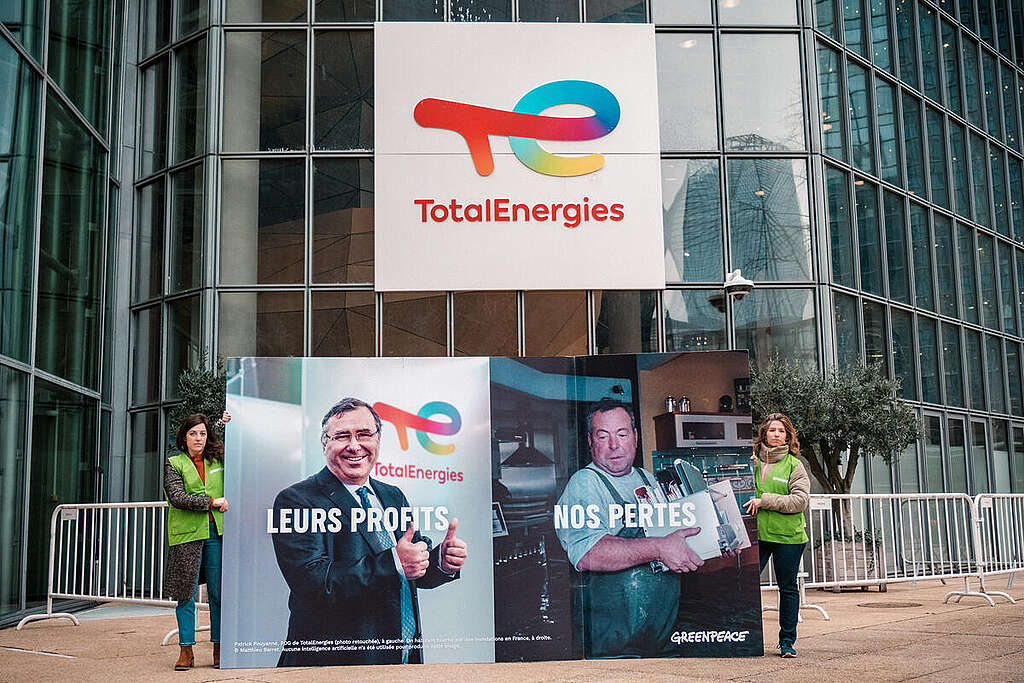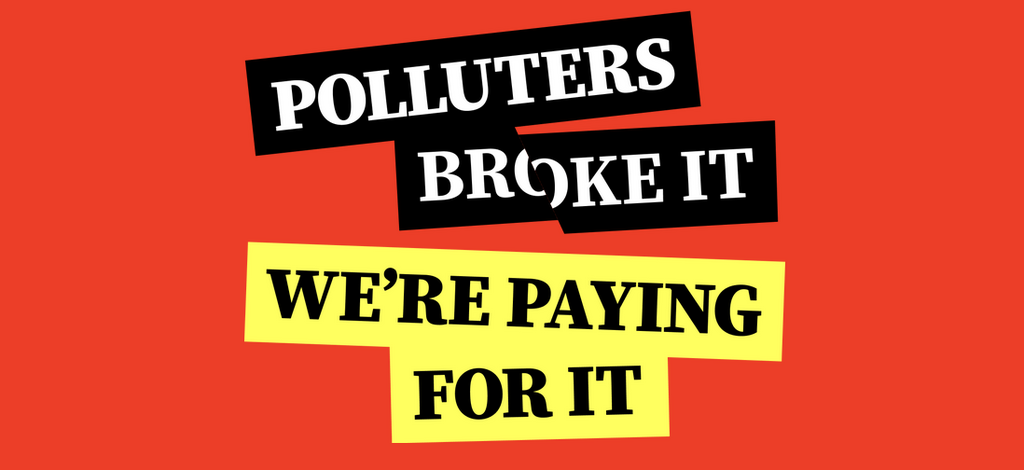On 5 June 2025, TotalEnergies appeared before a court for the first time to answer for the credibility of its climate commitments. This landmark legal action, brought by Friends of the Earth France, Greenpeace France and Notre Affaire à Tous, with support from ClientEarth, could mark a decisive turning point in the fight against corporate greenwashing.
This is historic: TotalEnergies is being brought to justice over greenwashing and must justify the "climate strategy" it promotes to consumers. It's the first time a French court will assess the truthfulness of a fossil fuel company's climate claims.

In March 2022, together with Friends of the Earth France and Notre Affaire à Tous, Greenpeace France took legal action against the French multinational for misleading commercial practices. At the heart of the case are its advertising campaigns, which highlight its investments in renewable energy… while diverting attention from its core business: oil and gas.
TotalEnergies is still drilling for more oil and gas
In 2021, Total rebranded as TotalEnergies. This new identity allowed the company to present itself as a key player in the energy transition, committed to developing a mix of energy sources and aiming for carbon neutrality by 2050.
But the science is clear: achieving "net zero" requires drastic reductions in greenhouse gas emissions… which means ending all new oil and gas developments. TotalEnergies continues to ignore these warnings, pushing ahead with new fossil fuel projects, including highly controversial developments in Uganda, Mozambique and Suriname.
The reality is that TotalEnergies remains, and fully intends to remain, a fossil fuel company. Analysis by Greenpeace France shows that in 2024, fossil fuels accounted for over 97% of TotalEnergies' total energy production and more than three-quarters of its investments. The company even plans to increase its oil and gas output in the coming years.
By focusing its advertising on wind turbines and solar panels, the multinational distracts the public from its polluting operations. This is greenwashing: a marketing strategy used by companies to polish their image while continuing harmful practices.
"Gas as a transition fuel"? Really?
One of TotalEnergies' most repeated arguments is that fossil gas is a "transition fuel". The company persistently promotes gas as a "cleaner" and "lower-emission" alternative to other fossil fuels. This narrative, pushed heavily in its advertising, misleads consumers about the true environmental impact of gas across its full lifecycle.
Make no mistake: gas is a fossil fuel, just like coal and oil. It is neither clean nor low-carbon. It emits large amounts of greenhouse gases, particularly methane, which has a global warming potential around 84 times greater than CO₂ over a 20-year period.

© Jean Nicholas Guillo / Greenpeace
While fossil gas may have once been considered a transition fuel in the 1990s and early 2000s, that is no longer the case, especially now that viable, efficient and cost-effective renewable alternatives exist.
In fact, TotalEnergies is not using gas as a temporary solution, but is instead massively expanding its exploitation, risking decades of continued fossil fuel dependency.
Beyond its devastating climate impacts, gas extraction also causes severe environmental harm, including threats to biodiversity-as seen in the Saloum Delta in Senegal-and serious human rights violations such as forced displacement. Amnesty reports have shown that Shell's oil and gas operations in Nigeria's Niger Delta have destroyed vital mangrove forests and led to violations of local communities' rights. TotalEnergies' Cabo Delgado LNG project in Mozambique has triggered a humanitarian crisis, with communities facing violence, displacement, and human rights abuses.
Strategically, this is also a social and geopolitical absurdity, which locks entire continents into dependency on an energy source subject to extreme price volatility and endangers energy sovereignty-especially in relation to authoritarian or unstable regimes like Vladimir Putin's Russia or Donald Trump's United States.
The end of greenwashing in sight?
By relentlessly expanding fossil fuel development, TotalEnergies continues to fuel climate breakdown and jeopardise our living conditions and future. Green-tinted rhetoric, rebranding and slick ad campaigns won't change that. Nor will its current investments in renewables, since these do not replace its fossil fuel production, which is still growing, against all climate logic.

In the face of a worsening climate crisis, driven in large part by the actions of this destructive industry, Greenpeace France are calling on the courts to protect consumers from environmental misinformation. That's why, alongside Friends of the Earth France and Notre Affaire à Tous, Greenpeace France and others have taken TotalEnergies to court.
Consumer law is clear: communications must be honest and verifiable, including in the context of environmental and climate claims. The decision that will follow the 5 June hearing could set a crucial precedent in France and beyond, sending a strong message to the entire fossil fuel industry.
Now it's up to the courts to decide: can climate promises continue to be used as marketing tools if they mask business choices that fundamentally contradict the goals being promoted? We'll have the answer on 23 October 2025.
Sign the pact, record your story. Join the global movement to make polluters pay.
This article was originally published on the website of Greenpeace France. Camille Collin is a Digital Campaigner with Greenpeace France. It has been adapted by Mehdi Leman, Content Editor at Greenpeace International.

 (@greenpeace)
(@greenpeace)





